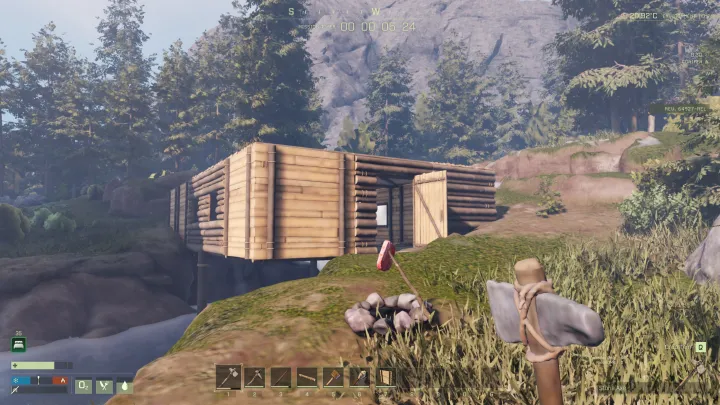I went into my preview of Icarus, the upcoming title from DayZ creator Dean Hall’s studio RocketWerkz, not knowing much about it. As it turns out, this was probably the best way to dive into the game. My preview, guided by the game’s community manager Lorien Gugich and RocketWerkz COO Stephen Knightly, revealed that nothing in Icarus is permanent, and everything is always at risk.
Session-based survival
Survival-crafting games always put players in risky situations — it’s in their nature. Whether it’s Minecraft or Rust, players make their own stories by ending up in dangerous situations. Those stories either have good or bad endings, and it’s all up to the player. The same is true for Icarus, although it never lets players put just a bit on the table; it’s all-in.
That stems from the game’s most distinct feature: It’s session-based. While other survival-crafting titles plop you into a world that you can slowly build a home in, Icarus doesn’t exactly give you time to get that comfortable. Instead, you take part in Prospects, different missions that plop you into the massive world of Icarus and give you an objective. That objective could be something as trivial as surviving for an hour or something a bit more demanding, like getting a certain material.
Either way, you don’t have long to do it. Prospects in Icarus last a bit over an hour, and once that clock ticks down to zero, you better be on your escape pod off the planet. Otherwise, you’re left behind. That’s not terrible, since you get to continue playing as that character. What is punishing about missing that last shuttle off the planet is that you don’t get to keep anything you had.

Almost everything in Icarus is specific to that session. The buildings you create, the items you build, and the materials you collect, will likely all be lost. You only keep your character, your character’s progress, and whatever they’re carrying on them. Everything else disappears once the Prospect ends.
That’s one of Icarus‘ strongest points. Wipes in games like Rust and Escape From Tarkov, both of which chart player progression by what’s in their inventory, are, well, a disincentive to me. Icarus makes it easier to play a bit fast and loose because nothing is forever. You can go into a Prospect knowing that you may well lose everything, and that threat is freeing.
Of course, that doesn’t mean that Icarus isn’t challenging — in fact, it’s quite difficult. From the get-go, you’re forced to start worrying about your character’s health. They have multiple meters to mind, including hunger, thirst, and oxygen. In between tending to your character, you’ll have to build a small shelter to store items in and, unless you like wandering through the pitch-black dark, rest.
Your character is frail, but your starting buildings are even more so. In Icarus, players aren’t meant to fight each other (although the spear that I accidentally threw into my tour guide’s foot says it’s possible). Instead, the “E” in the game’s PvE stands for environment. Sure, there will be aggressive wildlife to deal with, but past that, the forces of nature will be your greatest threat.
In Icarus: First Cohort, that threat will mainly come in the form of storms that can knock down your hastily-built shacks as if they were playing cards. So, if we’re keeping count, players have to be mindful of their character’s hunger, thirst, oxygen, health, and their home’s structural integrity. During the hour you have to spend in a Prospect, every single minute will be put to use monitoring one of these things.
Icarus‘ robust tech tree makes it much easier to keep everything in check. By putting enough points into it, players can build the weapons and tools they need to survive, along with sturdier structures, or replenishing consumables. A trait tree provides more basic character upgrades, like more health or carrying capacity.

All of this makes Icarus a race against time and the eventual loss of everything you have. If you miss a transport off a planet, you lose everything. If you die, you’ll probably lose everything. The only constant between Prospects is your character and their abilities. Beyond that, you can’t take anything for granted.
My time with Icarus was, in all, pretty challenging. The game, which still needs some optimizing, didn’t run very well, topping off at around 40 frames per second, but averaging around the mid-20s. I also died. A lot. While I was hunting for food, I ended up becoming a bear’s prey. Another bear attack stopped me from getting off the planet, which seemingly just liked having me around so much it didn’t want to let go.
Icarus has a lot of potential to be one of the next big survival-crafting titles, despite its performance issues. The game’s world is gorgeous, and exploring it, even in hour-long segments, is a fresh way to go about an open world. Instead of settling in one area and slowly exploring outwards, Icarus constantly forces players outside of their comfort zones, a trait that can end up making an enormous difference.



